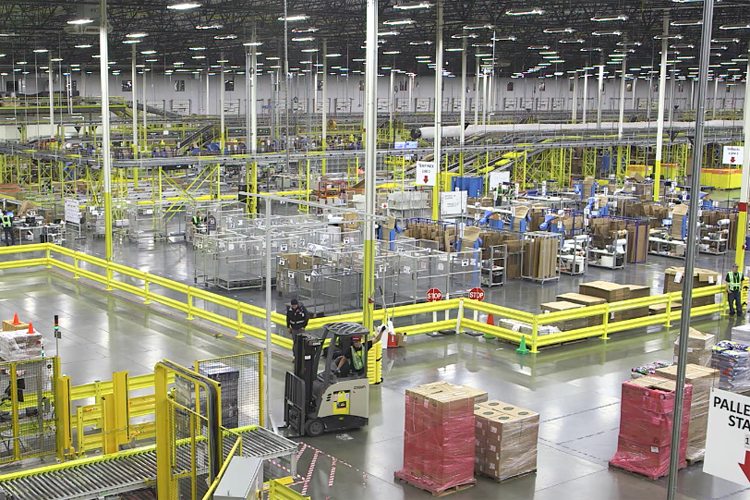Amazon have come under fire having been forced to reveal for the first time the amount of Business Rates that they pay. In a House of Lords communications committee meeting Lesley Smith, Amazon’s director for Public Policy in the UK & Ireland stated that Amazon paid £63m in rates.
As one might expect, the Daily Mail headline screams in outrage that “Amazon pays just £63m in business rates despite £8billion worth of sales… a third that of John Lewis”, totally missing the fact that rates are based on land values and have absolutely nothing to do with turnover, sales or profits.
I’m pretty sure that John Lewis also have out of town warehouse distribution centres with relatively low business rates and that’s exactly the same as Amazon. The difference is that High Street retailers also have an estate of shops on High Streets and they attract very high business rates.
Business rates are a pretty certain form of income for the government as they’re based on land. Unlike business profits and losses, land doesn’t tend to disappear (apart from a bit of natural erosion… we do live on Islands) and so the only question is how are business rates spread across built up and rural areas equitably.
If Amazon’s business rates were to be hiked just because their turnover is relatively high, then just about every online retailer including small businesses would likely also see their business rates rise – although there’s a question of scale, anyone with a warehouse will pay based on a similar business rate scale as Amazon.
Business rates are generally re-evalutated every five years, although the last assessment due in 2015 was delayed until 2017. This means that the time to complain about Amazon’s business rates has passed and it will be several years until the next evaluation where rates are due to be changed.
Calling for Amazon to pay higher business rates could only be considered reasonable if you would equally like to see higher business rates for your warehouse. The Daily Mail may scream unfairness but, as has always been the case, turnover is irrelevant for taxation and where Amazon should be paying taxes is through Corporation Tax based on their profits. It’s a very fair argument that Amazon should pay more UK tax…. just not through Business Rates.
Amazon Statement
Amazon published a statement following the House of Lords revelation regarding their business rates:
“As part of the broader debate around business rates, the story of Amazon’s contribution to the UK economy, through jobs, investments and business rate payments, hasn’t always been clear.
In the past, some reports about the business rates that Amazon pays in the UK have been based on just a small number of our fulfilment centres in England and Wales, and did not take account of our substantial investment right across the country. We have close to 100 UK sites, and last year Amazon paid business rates of more than £63 million – tens of millions of pounds more than estimates and more than is paid by many well-known high street retailers. These sites include fulfilment centres, research and development centres, corporate offices in London, Amazon Lockers, Whole Foods Market stores, and delivery stations. These diverse facilities are home to more than 27,000 full-time employees and the result of nearly £10 billion invested across the UK since 2010.
Many of our facilities are very large—a million square feet or more with thousands of employees—and need to be located outside city centres, with major transportation links that enable us to meet the needs of customers and sellers. Other locations, like Whole Foods Market stores, our corporate offices, and research and development centres, are in the heart of major cities like London. In each case, the business rates for those facilities are set by local authorities.
The facilities are part of our efforts to offer shoppers and small entrepreneurs the best possible experience, whether they live in London or Lynton. And we’re proud to have created tens of thousands of good jobs and billions of pounds of investment across the country.
Online sales are still less than a fifth of total retail sales in the UK, and Amazon is a small percentage of that – perhaps a lot less than some people realise. We’ll continue working hard to earn customers’ trust and, if we’re successful and British customers choose to shop with us, we’ll continue to invest and create jobs in the UK to meet that demand. And, of course, we’ll continue to pay all the taxes owed in every community that we call home.”
– Amazon











One Response
Honestly the business rates system is an outdated taxation that is not fit for purpose these days. The dumb thing is it restricts investment. For example if you make plastic widgets and buy a £million automated machine that is added to your business rates! Compared to someone that just used the space to store boxes they would have a much higher business rate bill.
As far as I am concerned the answer is simple, there should be a simple base tax per cubic meter of space that is the same for all commercial space. The value of the building or the rent is irrelevant. The business is then taxed through the corporation tax system, closing the loopholes that allow multi-nationals to move profits offshore.